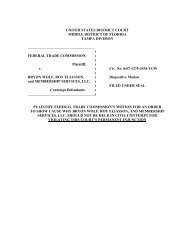HELO RCPT TO QUIT MAIL FROM DATA - Federal Trade Commission
HELO RCPT TO QUIT MAIL FROM DATA - Federal Trade Commission
HELO RCPT TO QUIT MAIL FROM DATA - Federal Trade Commission
Create successful ePaper yourself
Turn your PDF publications into a flip-book with our unique Google optimized e-Paper software.
<strong>Federal</strong> <strong>Trade</strong> <strong>Commission</strong><br />
As noted previously, this Report uses the term “spam” to refer only to<br />
the fraudulent, deceptive, or misleading email messages that typically contain<br />
falsified header information and other core violations of CAN-SPAM. Thus,<br />
spam is distinguished from legitimate marketers’ UCE messages – which some<br />
consumers may want to receive and others may not.<br />
Theoretically, ISPs and consumers could easily filter out any email with a<br />
subject line label. As explained in this section, however, there are three important<br />
considerations that argue against imposition of mandatory subject line labeling.<br />
First, subject line labeling is unlikely to enhance the sophisticated filtering<br />
strategies that ISPs use and are constantly improving. Further, subject line<br />
labeling likely would have little value for ISPs because there is no reason to<br />
expect that outlaw spammers, who are already violating the CAN-SPAM Act<br />
and possibly other laws as well, would obey a subject line labeling requirement.<br />
Second, there are other potential practical or technological problems with<br />
implementing a subject line labeling requirement. Third, and finally, mandatory<br />
subject line labeling would not contribute in any material way to the strengthening<br />
of anti-spam law enforcement.<br />
A. Mandatory Subject Line Labeling Is Likely Not an Effective Tool<br />
For ISPs To Block and Filter Spam<br />
1. Mandatory subject line labeling will not enhance ISPs’ current<br />
techniques for combating spam<br />
The ISP industry’s standard practice is to prohibit unsolicited bulk email. 38<br />
ISPs and email filtering companies attempt to enforce this prohibition mainly<br />
through a multi-layered approach that involves email blocking and filtering<br />
software. 39 Many ISPs’ first layer of defense is email blocking. 40 There are<br />
several reasons why an ISP would choose to block certain email. For example,<br />
an ISP may block a message because it comes from an Internet Protocol (“IP”)<br />
38. See, e.g., acceptable use policies of Earthlink (http://www.earthlink.net/about/policies/use;<br />
http://docs.yahoo.com/info/guidelines/spam.html), Comcast (http://www.comcast.net/terms/abuse.jsp), AOL<br />
(http://postmaster.aol.com/guidelines/bulk_email.html), Microsoft (http://privacy.msn.com/anti-spam), and<br />
UOL (http://www.netzero.net/legal/terms.html, http://www.juno.com/legal/accept-use.html and http://www.<br />
mybluelight.com/legal/terms-bluelight.html).<br />
39. Email blocking occurs at the point of attempted connection to the ISP’s network. Email filtering<br />
occurs once an email enters the ISP’s network, but before it reaches a recipient’s in-box. Confidential 6(b)<br />
Order Responses. UOL: Squire, 8.<br />
40. Confidential 6(b) Order Responses.<br />
10

















